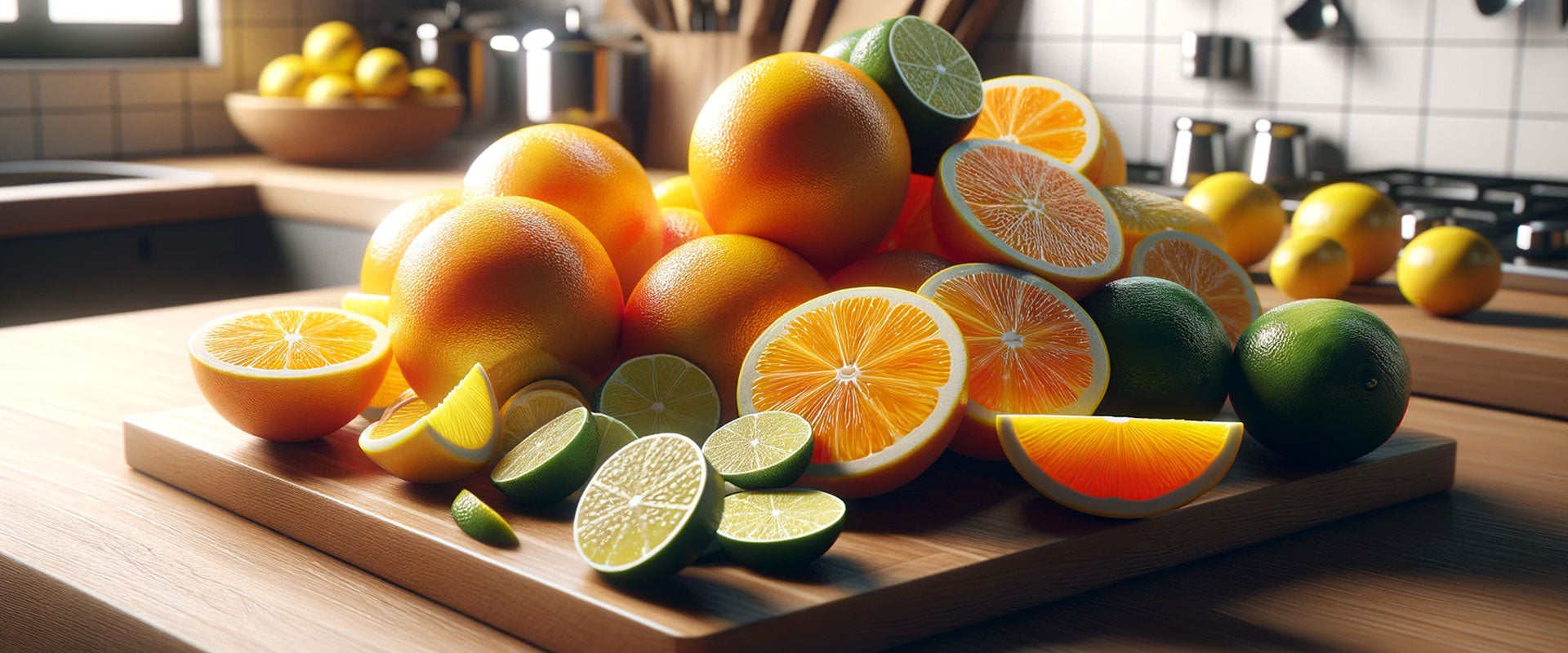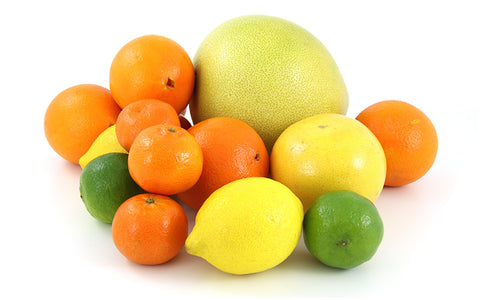Mastering Citrus Extracts with 200 Proof Food Grade Ethanol

Citrus fruits, such as oranges, lemons, limes, and grapefruits, are powerhouses of flavor, nutrition, and aroma. Extracting citrus fruits with 200 proof food grade ethanol is quick and easy, however understanding their anatomy can help you make the most of these fruits.
The Components of a Citrus Fruit
Citrus fruits are composed of several layers, each with its unique characteristics and uses.
- Pulp: The pulp, also known as the juice sacs or vesicles, is the innermost part of the citrus fruit. It's where you find the juice, which is full of vitamins and flavor. These sacs are held together by segments of thin membrane, offering a burst of flavor when bitten into.
- Pith: The pith is the white, spongy layer found beneath the outer peel or zest. It serves as a protective layer for the fruit, but when it comes to culinary applications, it's often avoided due to its bitter taste.
- Zest: The zest is the colorful, outermost layer of the citrus peel. It's rich in essential oils, offering an intense aroma and flavor. This is the goldmine for anyone interested in citrus extractions, as the oils are highly concentrated here.

The Importance of Zest in Citrus Extractions
When making citrus extractions, the zest is where you want to focus. It's filled with natural essential oils, which are responsible for the citrus fruit's distinctive, invigorating scent and flavor. The juice, although flavorful and vitamin-rich, is not used in extractions due to its high-water content, which can dilute the extract and potentially introduce unwanted elements.
The Art of Zesting Citrus
When zesting a citrus fruit, you want to remove only the outer layer of the peel, avoiding the bitter pith. A microplane or serrated vegetable peeler can be your best allies. Glide the tool lightly over the surface of the fruit, rotating as you go, to collect just the thin layer of colored zest.
What about the juice?
When making homemade citrus extracts, it’s best to exclude the juice from your recipe. While the juice is delicious and vibrant on its own, it is mostly water and can dilute the alcohol concentration of your extract, reducing its shelf life. Instead, save the juice for other uses—squeeze it into a glass for a refreshing drink or slice the remaining pulp into wedges to share with your family or use in another recipe. Keeping the juice separate ensures your citrus extract remains potent and long-lasting.
Selecting Citrus Fruits for Extraction
Choosing fresh, high-quality citrus fruits is paramount for a successful extraction. Look for fruits that are firm, brightly colored, and free from blemishes. They should feel heavy for their size, indicating they are full of juice and, therefore, have healthy, oil-rich peels.
In conclusion, understanding the anatomy of a citrus fruit is key to making potential. By focusing on the zest, you can harness the intense aroma and taste locked in the essential oils, creating extracts that can elevate your culinary creations to new levels. Remember to avoid the bitter pith and the juice when making extractions, and always select the freshest fruits for the best results.

Basic Citrus Extract Recipes
Exotic Citrus Extract Recipes
- Blood Orange Extract Recipe - Blood oranges are known for their deep red flesh and sweet-tart flavor with berry-like undertones. Their unique color and taste make them stand out among other oranges.
- Bitter Orange Extract Recipe - Bitter oranges have a sharp, tangy, and slightly bitter flavor. They are prized for their aromatic peel and are commonly used in marmalades and culinary applications.
- Buddha's Hand Extract Recipe - This unique citrus resembles a hand with finger-like segments. It has a fragrant, floral aroma and contains little to no juice, making it valued for its zest and aromatic oils.
- Kaffir Lime Extract Recipe - Kaffir limes are small, bumpy fruits with intensely aromatic zest and leaves. Their flavor is sharp and floral, commonly used in Southeast Asian cuisine.
- Key Lime Extract Recipe - Smaller and more tart than regular limes, key limes have a bright, tangy flavor. Their thin skin and distinct aroma make them a favorite in desserts and beverages.
- Kumquat Extract Recipe - Kumquats are tiny, oval-shaped citrus fruits with a unique twist: the peel is sweet, while the pulp is tart. They are often eaten whole and provide a burst of contrasting flavors.
- Mandarin Orange Extract Recipe - Mandarins are smaller, sweeter, and less acidic than regular oranges. Their easy-to-peel skin and delicate flavor make them highly popular for snacking and culinary uses.
- Meyer Lemon Extract Recipe - Meyer lemons are sweeter and less tangy than standard lemons, with floral and slightly herbal notes. Their thin skin and mild flavor make them versatile in both sweet and savory recipes.
- Pomelo Extract Recipe - Pomelos are the largest citrus fruit, with a thick rind and mild, sweet flavor. They are less tangy than grapefruit and have a slightly floral aroma.
- Tangelo Extract Recipe - A hybrid of tangerine and pomelo (or grapefruit), tangelos are juicy with a sweet-tart flavor. Their loose skin makes them easy to peel, and they combine the best traits of both parents.
- Yuzu Extract Recipe - Yuzu is a highly aromatic citrus fruit with a tart, floral flavor reminiscent of a mix between grapefruit and mandarin. Its zest and juice are prized in Asian cuisine and beverages.





